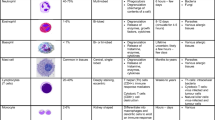Abstract
Many viruses enter lympho-reticular cells during pathogenesis and thereby induce immunosuppression1, which is of practical importance in that it may be related to overall virulence2. Immunosuppression may result from a selective infection, as viruses often show an affinity for different lymphocyte sub-populations: Epstein–Barr virus, for example, infects only a small percentage of B cells3. We reported previously that herpes simplex virus (HSV) type 1 suppressed the induction of an antibody response to diptheria toxoid in cultures of human tonsil cells, and that this seemed to result from the infection of a small percentage of T lymphocytes4. However, as fully infectious virus was used in these experiments, it had probably spread from cell to cell in the course of the culture, so complicating the interpretation of the results. Accordingly, we have now re-investigated the mechanism of immunosuppression using temperature-sensitive (ts) mutants which fail to complete their growth cycle in the conditions selected for antibody synthesis. In this study, mutants tsB, tsD and tsF, derived from HSV type 1 strain 17, and ts 9, derived from HSV type 2 HG 52, were used. The results suggest that the immunosuppression is due to the selective infection by the viruses of helper T cells.
Similar content being viewed by others
References
Notkins, A. L., Mergenhagen, S. E. & Howard, R. J. A. Rev, Microbiol. 24, 525–538 (1970).
Wiktor, T. J., Doherty, P. C. & Koprowski, H. J. exp. Med. 145, 1617–1622 (1977).
Menezes, J., Jondal, M., Leibold, W. & Dorval, G. Infect. Immun, 13, 303–310 (1976).
Pelton, B. K., Imrie, R. C. & Denman, A. M. Immunology 32, 803–810 (1977).
Janossy, G., De la Concha, E. G., Waxdal, M. J. & Platts-Mills, T. A. E. Clin. exp. Immun. 26, 108–117 (1976).
De la Concha, E. G., Oldham, G., Webster, A. D. W., Asherson, G. L. & Platts-Mills, T. A. E. Clin. exp. Immun. 27, 208–215 (1977).
Gmelig-Meyling, F. & Ballieux, R. E. Vox Sang. 33, 5–8 (1977).
Brown, G. & Greaves, M. F. Eur. J. Immun. 4, 302–310 (1974).
Author information
Authors and Affiliations
Rights and permissions
About this article
Cite this article
Pelton, B., Duncan, I. & Denman, A. Herpes simplex virus depresses antibody production by affecting T-cell function. Nature 284, 176–177 (1980). https://doi.org/10.1038/284176a0
Received:
Accepted:
Issue Date:
DOI: https://doi.org/10.1038/284176a0
- Springer Nature Limited
This article is cited by
-
Herpes simplex virus and the rheumatic diseases
Rheumatology International (1989)
-
Suppression of humoral immune response against Herpes simplex virus induced by defective strains, ts- and TK? mutants
Archives of Virology (1988)
-
Expression of immunity to intravaginal herpes simplex virus type 2 infection in the genital tract and associated lymph nodes
Archives of Virology (1987)
-
Neutralising antibody in mice with primary and recurrent herpes simplex virus infection
Archives of Virology (1982)





